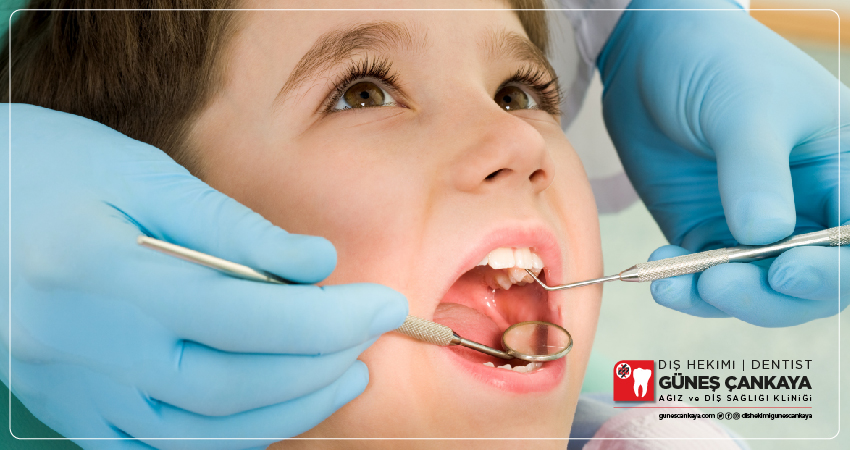PEDODONTICS (PEDIATRIC DENTISTRY)Our Children,
in Our Specialist Doctors' Hands...
- Homepage
- Pedodontics (Pediatric Dentistry)

PEDODONTICS (Pediatric Dentistry)
Pedodontics (Pediatric Dentistry) is a department that aims to protect the milk and permanent teeth of 0-13 age group children in a healthy manner and to eliminate the problems caused by caries, trauma, hereditary and similar factors in these teeth.
The Importance of Deciduous Teeth
There are 20 deciduous teeth in total. The primary task of deciduous teeth is to provide nutrition to the child. In addition, the proper development of speech also depends on the presence of deciduous teeth. Deciduous teeth protect the area they cover for the permanent tooth that will replace them and guide it while the permanent tooth is erupting. When the primary tooth is pulled out early, this natural place-holding function disappears. The primary aim of pediatric dentistry is to take measures to prevent dental problems and to guide children to a caries-free future. The procedures applied for this purpose are called Preventive Dentistry Practices.
Protective Applications
Among the preventive practices aimed at preventing dental caries, great importance is attached to educating the child and his family about oral health and nutrition. In our clinic, tooth brushing technique is applied to our patients. Superficial fluoride and fissure sealant treatments are among the preventive dentistry applications.
Fissure Sealant
It is a fluid filling material that closes the deep and decay-prone fissures (grooves) on the chewing surfaces of the permanent teeth and does not allow bacteria to reach it and thus prevents caries. Fissure sealant applications should be checked every 6 months.
Fluoride Applications
Fluoride is an element that prevents tooth decay, strengthens the structure of teeth. Since the tooth enamel is not fully matured when the teeth first erupt, newly erupted teeth are usually more resistant to caries and prone to caries formation. Fluoride strengthens tooth enamel, protecting the tooth against acid attacks and therefore helping to prevent tooth decay from forming. Professional superficial fluoride application is a preventive method that can only be applied by dentists. Superficial fluoride should be applied by a dentist every 6 months.
Tooth Decay
Tooth decay is a disease that begins with the destruction of tooth hard tissues with acids produced as a result of the fermentation of nutrients by bacteria on the tooth. Especially in early childhood, common caries seen in young children as a result of putting foods such as honey, sugar or biscuit milk in the bottle during sleep and giving them to the child, and dipping the pacifier in sugary foods are called bottle caries.
Teeth Traumas
One of the most common problems in childhood is traumatic injuries. Treatment is carried out taking into account the age of the patient, the degree of injury, its region, the tissues of interest and the general condition of the patient.
Placeholders
In early milk tooth loss, apparatus called placeholders are used to protect the location of the permanent tooth that will come from below. Placeholders are appliances that prevent the neighboring teeth from moving to the extraction cavity and thus the permanent tooth is either buried or coming out of a different place, thus preventing orthodontic disorders in the future. The treatment of children who are compatible with the dentist is carried out in clinical conditions, and the treatment of children with intellectual disability or anxiety is carried out by sedation or under general anesthesia. [ref:medipol]
What Do Pedodontists Do? How do they do it?
Pedodontists can apply all the treatments performed in dentistry in a special way to the child patient:
It turns dental treatments into a game with the most appropriate examination and treatment techniques for the child. In this way, there is no fear of the dentist in children.
Determines the caries risk group and performs protective-preventive applications (such as fissure sealant, local fluoride application) for this.
It follows the jaw development and teething during growth-development, and possible tooth crowding is prevented with protective orthodontic treatments.
In cases where permanent teeth are missing, toothed prostheses improve the aesthetic appearance and chewing.
Performs dental treatments of children who need special care.
Why should I consult a pedodontist for my child's oral health?
Children are not "little adults." Childhood, unlike adulthood, has features such as rapid metabolism and rapid growth and development. Similarly, the structure of milk teeth and newly erupted young permanent teeth is quite different from that of an adult tooth. Therefore, pedodontists are dentists with the most comprehensive knowledge in children's oral dental health.
When should my child's first dental examination be done?
It is recommended that the first dental examination be done after the first tooth erupts (6 months -1 year). With early dental examination, correct oral hygiene education is given, nutrition is regulated, and information is given about what needs to be considered in order to prevent caries. In this way, tooth decay is prevented while it is still in its infancy. With regular dental checks at the intervals determined by your pedodontist, the foundations of caries-free and healthy teeth are laid in the long term. [ref:DentgroupKids]